"We have more than that at the 4:00 mass on Saturday"
That was Community Support Organization advisor Terrel Broussard's reaction to the level of participation at the last Unified New Orleans Plan district-level meetings. He added that if more people don't start showing up for planning meetings, the legitimacy of the process may be questioned.
The solution: UNOP managers Steve Bingler and Troy Henry are revolutionizing civic participation in New Orleans with the "21st Century Town Meeting®".
Another problem with civic participation, according to WWL's Garland Robinette, is people who scream and shout at public meetings. Well, Bingler and Henry have seen to taking care of that.
It's important to ask exactly who Robinette is referring to in his imagined world, who is being affected by the approach Bingler and Henry are using to engage citizens, and critically, if any group of people benefits over others.
Robinette disparaged civic participation, falsely, on WWL Thursday while interviewing Bingler and Henry on the Unified New Orleans Plan process (right-click to download the mp3 recording -- another essential interview not available on the WWL archive).
When the Bring New Orleans Back Commission aired their final report -- and it was a public meeting -- you could barely hear what the report was about because of the protestors that came up to the microphone. And this, I would think, is as volatile as the BNOB thing. How do you control that part. How do you communicate along these lines. The people that plan on coming to the Saturday meeting, are they gonna hear a lot of screaming and shouting, or facts and figures and what's being done?
Funny ... I don't remember seeing Robinette at the last BNOB meeting. And I don't remember "protestors" screaming and shouting over the presenters. True, there were some angry people with legitimate concerns about the BNOB plans, but everyone used the public comment period granted after the formal presentations for those frustrations to be expressed, and they adhered to the two-minute time limit.
It's useful to recall that the BNOB plans were drawn up without civic participation. Whatever the merits of its recommendations, and despite participation by the intellectual and business elite of New Orleans, citizens weren't polled to reveal what they wanted to happen in their neighborhoods before the BNOB plans were completed.
It may be true that some people stand up at some public meetings and rant. I'd say the problem is more that it's the only time they feel like they've been allowed to meaningfully participate in a political process. By the time they get to a microphone, all they can do is vent all that pent up frustration -- and that is a failure of the political process in a profound way. There ought to be a better way to channel people's thoughts and feelings before they get in front of a microphone.
Which leads me to the Unified New Orleans Plan process. Bingler and Henry claim to have a solution to orderly civic participation in the AmericaSpeaks "21st Century Town Meeting®":
AmericaSpeaks’ 21st Century Town Meeting Town Meeting restores the citizens’ voice in public decision making by creating an opportunity for the general public to give those in leadership positions direct, substantive feedback on key public issues. Each meeting effectively restores the balance of the 'political playing field' by engaging thousands of general interest citizens at a time (up to 5,000 per meeting), effectively and quickly summarizing citizen input and widely disseminating the results through media coverage. AmericaSpeaks’ role as neutral convener increases confidence among citizens and decision-makers that the content, process and outcomes are fair and balanced.
Considering the results at Saturday's Community Congress, I'm unimpressed. I don't find the use of technology to collect citizen input as the problem. I merely question its utility and accuracy when there's extremely limited participation. That's not necessarily AmericaSpeaks' problem, but I would think that the non-profit would be concerned about participation, and establish, minimally, an acceptable statistical threshold of representative participation. Instead, the organization may be more interested in using New Orleans as a proving ground for its methodology than in making sure the outcome is demonstrably robust. From the outset, AmericaSpeaks may be, intentionally or not, misrepresenting the current character of New Orleans. For the organization to claim that "more than 100,000 New Orleanians ... have not returned to their city following Hurricane Katrina" when the actual number is twice or three times as large, is about as accurate as saying that more than 10 people have returned.
In the WWL interview, Bingler said that 1500 people turned out for the 13 planning district meetings across the city on October 14th, with attendance as low as 75 in some districts, and up to 200 in others. Compared to over 100,000 homes destroyed, and hundreds of thousands of people still homeless, 1500 is a pitiful number. Nevertheless, gullible Robinette accepted Bingler's response that, thanks to Bingler's "polls," he could say that the few who attended those meetings were representative of the demographic cross-section of those districts. Really? I wouldn't say that Bingler's claimed complexion of the District 4 planning meeting I attended reflected the actual demographic character of District 4.
It's true that at Saturday's Community Congress, instead of the emotional outbursts Robinette imagined, thanks to AmericaSpeaks, there were people participating in "even-handed input" using a "set of interactive, very simple keypads ... to express preferences and priorities associated with a number of different areas." On the other hand, the people who attended aren't the types who normally feel disenfranchised from the political process. It's also true that the questions people were asked to answer were extremely banal. Of course people want good schools and hospitals.
What was immediately apparent walking in the door was that there were a lot of empty tables (which might be considered an improvement from previous venue fiascos), and that of the 200 to 250 people in the room (far fewer than the 1500 at the last citywide meetings), about a third were AmericaSpeaks facilitators, planners, or students monitoring the process. As Michelle Krupa reported in The Times-Picayune from actual AmericaSpeaks participant poll results, the vast majority were relatively wealthy white residents from dry neighborhoods, compared to about a 67 percent black population in New Orleans pre-Katrina, having an average income of less than $30,000.
Now, imagine that January 15th rolls around and the citywide UNOP plan emerges, but there's more investment going to well-off, predominantly white neighborhoods, than to poor black neighborhoods. Imagine what that could do to the process.
Rather than balancing the political playing field to create a fair outcome, by empowering a minority population with the ability to make decisions about what will happen for the majority, AmericaSpeaks may actually be creating the conditions, and the evidence, for a process that may be criticized as illegitimate if the rest of the population disagrees with the outcome.
And what of the use of multiple choice responses fed into a process using keypads. Is the use of technology in the planning process a pancacea, or the latest filter to control opinion and outcomes by controlling access to the machinery of decision making, and hence, access to money and power?
What is the message to people who have more to say than what they're permitted to input in a keypad? For some people, the message may be that their story isn't important. Their voice isn't important. UNOP isn't interested in the fact that they feel like they haven't been heard before. UNOP isn't interested in anything they have to say, or scream or shout if they feel that's what they need to do. The only acceptable input is to enter preferences into a keypad, and the menu of choices to think about will be supplied. Once those preferences are indicated, they'll be posted on a Web site. It's all there for everyone to see (eventually) on the Web site (if you can find it). Of course everyone I've met whose involved in the UNOP process cares about the people struggling to recover from Hurricane Katrina, but the process design may send a message of disinterest or disregard.
It might be that the Community Congress isn't an appropriate venue for people to comment on the process -- that the Community Congress is an opportunity to vote on a narrow range of planning choices. Still, the "21st Century Town Meeting®" sounds like a whole lotta mumbo jumbo for what we in the United States have for over 200 years more popularly called a ballot box.
No, no, no. We've outlived that antiquated technology. As Steven Bingler can frequently be heard to say, in apology for poorly-planned meetings that collapse into chaos and accomplish little of substance, "somebody once said democracy's a very messy process." No, he can't remember who said that. It might have been him, as a way to ameliorate his own failure to create the conditions for public input in an organized manner (it has also been said that it may be personal style to create chaos as a way to divide and conquer in forums with potentially contentious groups). It certainly may be true that issues can be controversial and emotional, but the means to decide on those issues without bloodshed and chaos absolutely do exist, and have worked for over 200 years in this country, as long as the affected participants feel like they've had a fair playing field to express their views.
It's all wires and chips and keypads and groupware and passing information and receiving information and a bunch of gratuitous terminology to make modern civic participation sound sophisticated. But civic participation using paper and ballot boxes doesn't require high-tech contracts. It only requires the large-scale participation of an informed public, a box to collect their preferences, and fair counting. The same problem that renders ballot box elections illegitimate, however, appears to be plaguing the UNOP/AmericaSpeaks process: Participation.
I'd like to call for the use of a technology that's not quite as antiquated as the ballot box, which isn't trademarked, and which may be more helpful with public participation: Buses.
I have to question the expenditure of $2.3 million on a "21st Century Town Meeting®" when it might be more effective, and a better guarantee of participation, to send planners out to the places where New Orleans residents have been displaced, or to bring those residents to planning meetings in New Orleans. It may be true, as was mentioned at the Thursday UNOP Community Support Organization meeting, that planners will eventually be sent to "diaspora" cities. I just wish that mass transit were built into the process a long time ago -- like before the UNOP process began -- like right after Hurricane Katrina -- and for that vision failure, I place blame, and shame, on Ray Nagin, who still doesn't seem to understand what's going on, and how buses could be part of the solution for the city's problems.
It's important to try to understand the reasons why participation in the planning process has been so low. It's true that over 200,000 New Orleanians are still displaced far outside the city. That's a problem Concordia should try to resolve through outreach. But there are other factors. People are working. They have busy schedules. They may need transportation. They have families, and children who may need child care. A lot of people I've talked to simply can't attend some of these meetings when they're scheduled. Maybe more than one meeting place and time needs to be made available.
Loyola professor Virginia Olander wrote an opinion which was printed in the Times-Picayune on Saturday in which she mentioned how teachers need to understand Maslow's Hierarchy of Needs when they go into a classroom. Teachers can't teach effectively if they're competing for the attention of kids whose basic needs for sleep and food and stable homes aren't being met. It's the third time I've heard Maslow's Hierarchy mentioned since Hurricane Katrina. Lisa and Valerie have both mentioned it too. It's true -- a lot of people are just struggling to survive. They may not be able to afford the luxury of attending planning meetings, and may expect that someone will look out for them to make sure that planning for their neighborhoods' recovery will be taken care of.
I talked to a pair of black women from the Treme neighborhood as they were exiting the Community Congress. They weren't exactly critical of people who couldn't be there, but they did say that if it were important enough, people would be there. They seemed to be placing blame on citizens themselves, but it's also important to recognize that both women were living in their houses. Others may not be so lucky as to have a house they can live in right now, in particular if they were renters before. On the other hand -- as it occurred to me later -- they might also have been inferring that the planning meetings, like the Community Congress, were lacking in the type of substance that would attract many people.
Then one of the women said, "they can have a second line here, but they can't make a meeting." They're right. There have been some very well-attended second line parades in New Orleans since Hurricane Katrina. At the same time, both women suggested I should try to understand better what people are experiencing. They both underscored how hard they've worked to fix their homes, and how hard they were working to plan the rebuilding of the city. They expected the same level of commitment from others.
I think the second line comment merits investigation. Why is it that people can attend a second line but not a planning meeting? Is it that their informal communications networks are more effective than UNOP's more traditional outreach approach to date? Is it that second line parades are considered more valuable as community building experiences than official planning meetings? Do official planners understand how to communicate with these people? Apparently not -- and who could blame them. The Social Aid and Pleasure Clubs are fairly secretive operations -- or at least fairly inaccessible to the outsider. But precisely because of the strength of those organizations, it might be a good idea for Concordia to tap into those parade networks -- maybe hire some club leaders to stimulate interest in upcoming planning events, or move planners into those networks to conduct planning activities.
It shouldn't take months to figure out this stuff. I'm not saying the job of outreach is easy or obvious. I just wish we could stop hearing excuses for the lack of participation, and I wish it were stated openly what the consequences of low participation rates may have on the perceived legitimacy of the process later. Instead, it seems we were treated to the Henry-Lukensmeyer corporate team-building show, with each in turn running onstage to shake hands, and calling for the audience to give rounds of applause to various speakers.
I'd like to see Concordia not just apologize for the shortcomings of the planning process it's managing, but start to actually deliver on its promises of more participation, and more transparency. And when it promises to make available what it says is one of the most important deliverables in its celebrated extensive data collection process, the Recovery Data Atlas, citizens ought to be able to see it before they're expected to use it. The atlas wasn't available as promised before the Community Congress, nor at the Community Congress, nor on the UNOP Web site (still). Citizens were told at the Thursday CSO meeting that the atlas wouldn't be available on time because it was so good, and Concordia wanted to surprise everyone at the Community Congress. We're still waiting to be surprised.
I'm beginning to think that everything Concordia says now is just a ruse to disguise either unintended incompetence, or intended negligence. I'd prefer the former, but neither is acceptable. It's unfortunate that I have to characterize the process that way, because we all want to see the citywide planning effort succeed in an inclusive manner, but I'm just reporting what I see and what I hear.
It's long overdue time for change in the way things are done in this city. What Robinette imagines as the way things have been done, are instead symptoms of the way things have been done. It's time to address the real problems, not the symptoms -- imagined or otherwise.
Who but an urban planner would know how to solve problems, how to make order out of chaos, and how to gather public opinion in an effective manner? Where problems arise, analysis occurs, and the problems are solved.
Turning Bingler's frequent refrain upside down, the results of a democratic process may be "messy" (or politically difficult), but the process doesn't have to be. The process should justify the results -- not the other way around.
As for improving levels of civic participation, there may be hope (maybe Concordia is starting to get it right). As I was leaving the Convention Center, a woman stopped in the road in her Chevy Avalanche to ask me if there was a meeting in there somewhere. I said yes, but the meeting was over. She seemed extremely concerned that she missed it. I observed that she had piles of clothes and other personal possessions in the cab and bed of the SUV, including a kitchen sink. It occurred to me that she might be one of many New Orleanians still living in their cars for lack of anywhere else to go. As she got out of her SUV, I noticed she was wearing hospital scrubs -- so she was working. She admitted as much, and said that she was extremely busy, so she regretted she couldn't attend the meeting. She didn't really understand that it was a neighborhood planning meeting, but she knew somehow that she needed to be there. She asked a lot of questions, so I left her with a flyer and the 877 number to call. Like me, however, she doesn't subscribe to cable TV (hard to do if you're living out of a truck), so she won't be able to participate in the broadcast AmericaSpeaks forums. I suspect she'll be at the next meeting if it's scheduled at a time and place that doesn't conflict with her schedule.
10/30/06 update:
Among the participants I saw walking out of the meeting was Bishop O.C. Coleman from Greater Light Ministries. His entourage of four was far less than one might expect from a self-appointed leader in the community. Where were the buses Bishop Coleman? Coleman was reported to have donated $10,000 to Ray Nagin's re-election campaign. His company, Management Construction Consultant Inspection Inc., received $2.5 million after Hurricane Katrina to inspect the city's sewer and water systems, but MCCI wasn't incorporated until December 2005. A federal grand jury investigation of Coleman and his associate, Rev. Benjamin Edwards, is underway into corruption in the awarding of Sewerage and Water Board contracts to MCCI. Edwards sits on the Sewerage and Water Board. He admitted to spending $269,000 on radio ads and billboards to get Nagin re-elected. Meanwhile, Coleman's "False Prophets" page is still under construction.
Related:
Becky Houtman -- The Ballroom Speaks
PGR -- New this fall: Citizen clowns do back flips in the planning fake democracy circus reality show
3/25/2006 Community Gumbo
Here are photos from the Community Congress.

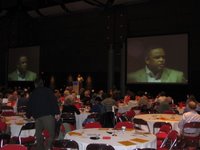
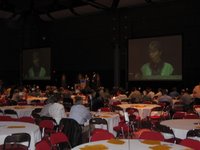
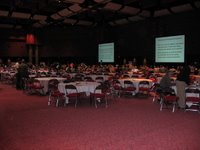
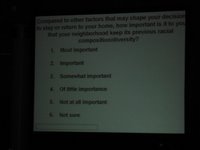
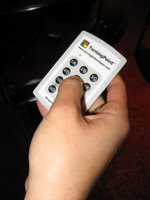
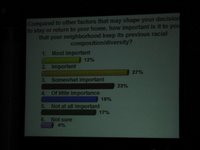
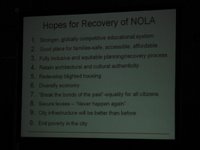
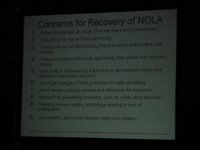
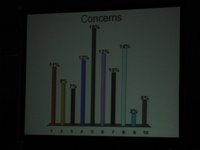
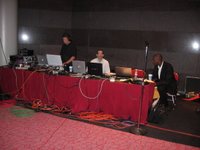
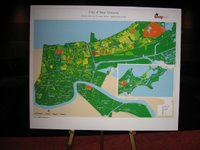
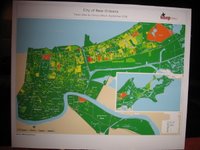
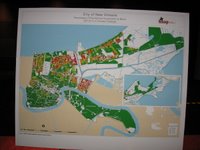
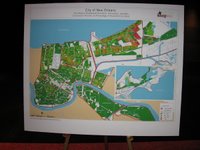
Tags: Hurricane Katrina | Katrina | New Orleans | Louisiana | America's Wetland | Bush is a moron | Impeach Bush | George W Bush | Bush | Worst President Ever | Ray Nagin | Worst Mayor Ever | Recall Ray Nagin | Rebuild New Orleans | We Are Not OK | Katrina Dissidents | Failure Is Not An Option | Katrina One Year Anniversary | Unified New Orleans Plan | UNOP | Civic Participation | Planning | AmericaSpeaks | Carolyn Lukensmeyer








11 Comments:
A mixture of despair and exhaustion kept me from attending.
Pleased to see that you mention buses. The bus is shaping up to be the most oft called for least provided basic service of this recovery process.
Send buses and people will come. It is a tradition in New Orleans,one that the organizers seem to know nothing about because they never depended on public transportation.
Maybe they should be recruiting the groups Nagin used to bus people in on election day -- of course, that would mean that he'd have to be participating in the process.
Well, in my experience, occasionally there are people who don't exactly scream at public meetings, but do show up just to make sarcastic remarks or to be a fly in the ointment. Sometimes you think, "Rock on!" other times you want to kick the person's keister. And then there's the person who likes to hear him or herself talk. The ideal is to have people empowered outside of those meetings, for them to be connected to some larger participatory effort? Otherwise, public hearings are practically a waste of time. Does that make sense?
In any case, the "survey" was insane. With 75 percent white turnout? Where can I get one of these consulting gigs?
Your right (itsnotme), although I've also heard audience members holler at people who use a public forum for their own grandstanding (as at the BNOB forum). Still, as long as everyone obeys the rules and stays within the allotted time, there's no harm done.
"The ideal is to have people empowered outside of those meetings, for them to be connected to some larger participatory effort."
Absolutely! And I say the more the merrier. When that happens, and there isn't enough time for everyone to talk, maybe we'd get more responsible people to speak on behalf of their respective groups.
I think most people do use public forums responsibly. In fact, that's often where the most of the people with common sense seem to be heard.
... which, by the way, is why I've said before that the public seems to know more about what's happening in New Orleans right now than the people who are in positions of leadership. I think we need more citizen participation in the decision-making process, and fewer gatekeepers. Take a look at the groundswell of civic activism in neighborhoods since Katrina -- it's perhaps the most amazing thing to happen to civic activism since ... the American Revolution? Is that going too far? People like Ray Nagin out to step out of the way if they're not going to inspire and lead. As Mitch Landrieu said in his campaign, we only have one shot to get it right, and with Ray Nagin, we got it wrong. It's time to correct the mistake. All those people who voted for Ray Nagin need to be in his face right now telling him what they think of him, or demonstrating to the rest of us that they made the right choice and that they're still involved in the recovery process.
Thanks for this thoughtful post.
As a member of the AmericaSpeaks team, I'd like to offer my own apologies for the shortcomings of this Saturday's meeting. It is indeed unacceptable to not have stronger, more representative participation.
While AmericaSpeaks was not involved with outreach for this past Saturday, we will be heavily involved with working with the UNOP team to ensure diverse participation in Community Congress II. In addition to providing free transportation, child care and translation services, we are in the process of finalizing diverse teams of grassroots organizations to assist with the outreach effort. Among them are ACORN, All Congregations Together, Jeremiah Group, and People's Hurricane Relief Fund. In addition to New Orleans, we are setting up teams of organizers to generate participation by New Orleanians in Atlanta, Baton Rouge, Dallas and Houston -- each of which will have a voice in the next Community Congress through forums that are linked to the forum in New Orleans.
I know that you have no reason to believe that we'll do better, but I can promise that our organization is absolutely committed to doing everything we can to ensure that all voices are in the process. The reason we offered to add the keypad polling technology to Community Congress I was to help make the process more transparent in terms of who is involved and who is not. In doing so, we have clearly highlighted the need for a stronger outreach effort to ensure that all are at the table.
I hope that you will stick with the process and join us as we move forward. Please email me at jgoldman@americaspeaks.org if you have any advice about how we can do a better job.
And another thing Mr. Schroeder, I heard there was only 1 local politician at this event. You would think if an event were important ALL the City employess, All the City Council, The Mayor and his entourage would all be there. HHHmm What makes them stay away in droves?
They show up when their ass is online, If you had a organized grassroots political organization that had a core of followers to show up at important events and you were in touch with what everyone else wanted plus ran a web campaine and sent out newsletters and email notifications for everyone in your group to take action on things you would see that your leaders would begin following.
Check out these email notices that go out from levees.org or from other organiztions like DFA. You should have something like this on the local level too.
This message was sent by your Progressive Democrats of Cambridge - DFA
organizer, Shai Sachs.
Hi DFA folks,
Today, September 19, is the day of the Democratic primary in
Massachusetts. Please make sure to vote! Polls close at 8 pm. Go to
http://www.wheredoivotema.com to find out where to vote.
We are proud to endorse the following three candidates for statewide
office. Each of them believes strongly in the importance of empowering
ordinary people to take part in government; each of them shares our
concerns and our progressive values. Help us elect these terriffic
candidates today!
DEVAL PATRICK for Governor
http://www.devalpatrick.com
ANDREA SILBERT for Lieutenant Governor
http://www.andreasilbert.com/
JOHN BONIFAZ for Secretary of the Commonwealth
http://www.johnbonifaz.com/
Read more about these great candidates on our website,
http://www.dfacambridge.org! Or visit the candidates' websites
individually.
Remember: polls close at 8. You can find your polling place by going
to http://www.wheredoivotema.com.
If you have some extra time today and would like to help turn out the
vote in Cambridge, please call Deval Patrick's Cambridge office at
617-864-9653, 1798A Massachusetts Ave., Cambridge.
See you at the polls!
Shai
or this one:
I'm here on the ground in Connecticut today, working with local Democracy for America groups in support of Ned Lamont. You should be proud of your DFA colleagues in Connecticut. Everyone is working incredibly hard to get out the vote.
This race has changed the political landscape.
It boils down to this: We have a powerful three-term incumbent Senator on the ropes because he won't question the Republican mess in Iraq. We've shown that Democrats can't be a rubber stamp for President Bush's "stay the course" approach.
The Iraq war is the defining issue of this year's elections. It's that simple.
This isn't about left or right, and it's bigger than any one political party. This is about honesty and reality in the American conversation. Right now, in Iraq, we're spending billions of dollars and destroying lives because of a failed policy.
Honest politicians have already acknowledged that Iraq is a disaster, and have been speaking out for months and even years. From Republican Chuck Hagel to Democrat Jack Murtha to Independent Bernie Sanders, serious people of all political stripes have stood up and spoken a simple truth. "Staying the course" will only lead America and Iraq into deeper disaster.
This election in Connecticut shows that President Bush's failed policies in Iraq are not only harmful for our country -- they're absolutely poison for campaigns.
As you know, the landscape didn't change overnight. Ned's insurgent campaign was powered by support from thousands of DFA members across Connecticut and around the country. Together, DFA members put Washington on notice that the war in Iraq is the defining issue for Democrats and for our country.
Our job is far from over, but we've already come a long way. Please forward this message to your friends and ask them to join the fight:
http://www.democracyforamerica.com/tell-a-friend
Thank you,
Tom
Yes! Here is the latest newsletter from the Urban Conservancy.
Is someone working to get all these groups to work together on common important issues so that your voice properly amplified?
"If you had a organized grassroots political organization that had a core of followers to show up at important events and you were in touch with what everyone else wanted plus ran a web campaine and sent out newsletters and email notifications for everyone in your group to take action on things you would see that your leaders would begin following."
Do you?
Not me personally, but our community is certainly involved in that way, as a result there is much more transparency and better sollutions for the majority of people as apposed to cozy deals for a few.
here is another newsletter I just recieved that you want to consider signing up for.
To subscribe or unsubscribe via the World Wide Web, visit
http://nolaagainstcrime.com/mailman/listinfo/nolaagainstcrime_nolaagainstcrime.com
You can reach the person managing the list at
nolaagainstcrime-owner@nolaagainstcrime.com
When replying, please edit your Subject line so it is more specific
than "Re: Contents of NOLAAgainstCrime digest..."
Today's Topics:
1. Fwd: Armed Robbery Arrests (nora@nolaagainstcrime.com)
----- Forwarded message from PMNoel@cityofno.com -----
Date: Tue, 31 Oct 2006 22:33:41 -0600
From: "Paul M. Noel" PMNoel@cityofno.com
Reply-To: "Paul M. Noel" PMNoel@cityofno.com
Subject: Armed Robbery Arrests
Early Sunday morning and late Sunday evening (10-29-2006), two
individuals committed four separate armed robberies at the following
locations: St. Ann and Burgundy, 1200 block of Burgundy, 900 block of
St. Ann, and 1200 block of Bourbon Street. After an extensive search,
Eighth District officers and detectives located the subjects in a
vehicle on Elysian Fields and gave chase. They were apprehended shortly
thereafter and a handgun and property taken from the victims were also
recovered. It is a strong possibility that these perpetrators will be
charged with other crimes in the Fifth Police District as well.
I know that there has been a lot of negative media attention recently
regarding crime in our area. While we cannot control who comes in our
area, I can assure you that any criminal entering the boundaries of the
Eighth District will have to run the gauntlet of uniformed NOPD
officers, Louisiana State Troopers and plain clothes detectives. I can
promise you that we are working hard every day to not only solve these
crimes but also prevent them before they occur. Thank you for your
overwhelming support! If you have any questions please feel free to
contact me.
Lieutenant Paul M. Noel
Commander,
Eighth District Investigative Unit
New Orleans Police Department
(504) 658-6724
----- End forwarded message -----
Early Sunday morning and late Sunday evening (10-29-2006), two individuals committed four separate armed robberies at the following locations: St. Ann and Burgundy , 1200 block of Burgundy , 900 block of St. Ann , and 1200 block of Bourbon Street . After an extensive search, Eighth District officers and detectives located the subjects in a vehicle on Elysian Fields and gave chase. They were apprehended shortly thereafter and a handgun and property taken from the victims were also recovered. It is a strong possibility that these perpetrators will be charged with other crimes in the Fifth Police District as well.
I know that there has been a lot of negative media attention recently regarding crime in our area. While we cannot control who comes in our area, I can assure you that any criminal entering the boundaries of the Eighth District will have to run the gauntlet of uniformed NOPD officers, Louisiana State Troopers and plain clothes detectives. I can promise you that we are working hard every day to not only solve these crimes but also prevent them before they occur. Thank you for your overwhelming support! If you have any questions please feel free to contact me.
Lieutenant Paul M. Noel
Commander,
Eighth District Investigative Unit
New Orleans Police Department
(504) 658-6724
----------------------------------
NOLA Against Crime - Keeping Our City Safe Together
NOLA Against Crime website: Report a Crime, Crime News, Forums, Events Calendar, Resources and more:
http://www.NOLAAgainstCrime.com
----------------------------------
NOLAAgainstCrime mailing list
Post a Comment
<< Home